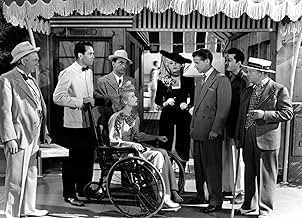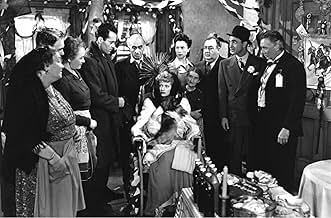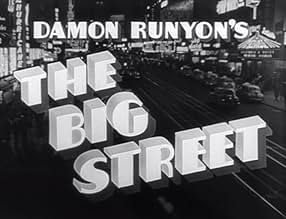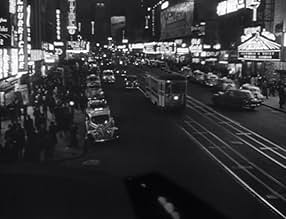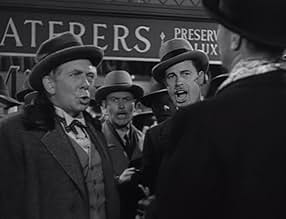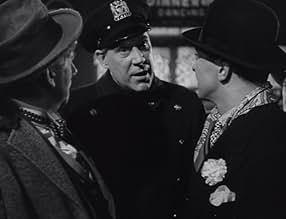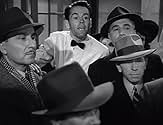AVALIAÇÃO DA IMDb
6,4/10
1,8 mil
SUA AVALIAÇÃO
Um empregado de mesa com uma paixão não correspondida por uma artista de discoteca aproxima-se dela após ter sido paralisada num ataque do seu namorado gângster.Um empregado de mesa com uma paixão não correspondida por uma artista de discoteca aproxima-se dela após ter sido paralisada num ataque do seu namorado gângster.Um empregado de mesa com uma paixão não correspondida por uma artista de discoteca aproxima-se dela após ter sido paralisada num ataque do seu namorado gângster.
- Direção
- Roteiristas
- Artistas
- Prêmios
- 2 vitórias no total
William T. Orr
- Decatur Reed
- (as William Orr)
Don Barclay
- Eating Contest Emcee
- (não creditado)
Mary Bayless
- Nightclub Patron
- (não creditado)
Louise Beavers
- Ruby - Gloria's Maid
- (não creditado)
Anthony Blair
- O'Rourke
- (não creditado)
- Direção
- Roteiristas
- Elenco e equipe completos
- Produção, bilheteria e muito mais no IMDbPro
Avaliações em destaque
"The Big Street" was not a major hit when first released but the critics at the time all noted Lucille Ball's superb star-making performance as one of the all-time nastiest women ever to reach the big screen. Lucy was already a minor star thanks to a string of popular B-grade comedies and dramas but this film cemented her stardom and brought her to MGM where she reached an early peak the next year. The film is sentimental and does have some plot points that have to be swallowed but Ball's great acting and chemistry with a splendid Fonda makes this tale of unrequited love work. Fonda plays a kind innocent busboy who falls madly in-love with a crippled chanteuse(Ball). The last scene on the dance floor is unforgettable. Why RKO did not get Lucy an Oscar nomination for this performance is a crime. All the critics at the time hailed her work in this but it just slipped under the rug when the film posted only small profits. This was the kind of role Bette Davis made her own but Ball does it without Davis' habit of falling into mannerisms. Agnes Moorehead is also excellent as Fonda's concerned friend. Beautiful cinematography makes Ball look incredible in her close-ups. Worth a look but overlook the occasional mawkish elements. Lucy makes it a must.
The Big Street (1942)
Packed with great actors, major and minor, in a fast fast whirlwind
First of all, Agnes Moorehead and Ray Collins played the previous year in another raging movie of some fame (Citizen Kane, yup), and here they are loaded up against a dozen other great character actors, plus a couple big names. Headlining is the well known Henry Fonda, still young, but fresh off of a couple great films, Grapes of Wrath (1940), and The Young Mr. Lincoln (1939). But in a kind of startling role for those who know Lucille Ball as a brilliant and goofy t.v. comedian a decade later, we have her here as a big-eyed femme fatale, or would-be femme fatale until fate takes a turn.
You might think this one is a screwball comedy the way it starts, but keep watching-- there is violence and trauma soon enough, and the movie takes a turn that Fonda is worthy of. There is a Frank Capra feel-good element amidst the hardship, but it is full of verve, and all these odd characters who really are (were and are) what New York is at its best. The director Irving Reis (with photographer Russell Metty) keeps the scenes snappy, and sometimes moves from a closeup of a face to a background quickly, to let a character make a dramatic point. There are lots of movie tricks, quick fades from scene to scene to show the passing of time, and some tacky back projection, and it really goes along with the fairy tale narrative.
And there really is an unbelievable ending, which you have to take with the whole flavor of the movie, a kind of sincerity/fantasy mixture.
Packed with great actors, major and minor, in a fast fast whirlwind
First of all, Agnes Moorehead and Ray Collins played the previous year in another raging movie of some fame (Citizen Kane, yup), and here they are loaded up against a dozen other great character actors, plus a couple big names. Headlining is the well known Henry Fonda, still young, but fresh off of a couple great films, Grapes of Wrath (1940), and The Young Mr. Lincoln (1939). But in a kind of startling role for those who know Lucille Ball as a brilliant and goofy t.v. comedian a decade later, we have her here as a big-eyed femme fatale, or would-be femme fatale until fate takes a turn.
You might think this one is a screwball comedy the way it starts, but keep watching-- there is violence and trauma soon enough, and the movie takes a turn that Fonda is worthy of. There is a Frank Capra feel-good element amidst the hardship, but it is full of verve, and all these odd characters who really are (were and are) what New York is at its best. The director Irving Reis (with photographer Russell Metty) keeps the scenes snappy, and sometimes moves from a closeup of a face to a background quickly, to let a character make a dramatic point. There are lots of movie tricks, quick fades from scene to scene to show the passing of time, and some tacky back projection, and it really goes along with the fairy tale narrative.
And there really is an unbelievable ending, which you have to take with the whole flavor of the movie, a kind of sincerity/fantasy mixture.
Broadway busboy Henry Fonda (as Agustus "Little Pinks" Pinkerton) idolizes self-centered lounge singer Lucille Ball (as Gloria "Your Highness" Lyons). When Ms. Ball falls on hard times, Mr. Fonda gets to lend a helping hand. The pair move to Florida, but tragedy follows
Although "Guys and Dolls" (1955) remains most representative, "The Big Street" captures the spirit of writer Damon Runyon's characters better than most Hollywood efforts, probably because Mr. Runyon produced.
They weren't the author's first choice for the leads, but Fonda's innocent charmer and Ball's selfish tragedienne are exemplary characterizations. Ball is especially noteworthy, as she did not receive many opportunities to play against type, and places herself squarely on par with the more successful "Golden Age:" actresses of the 1930s and 1940s; she is startling. Director Irving Reis coordinates his fine cast and crew very well, making camera angles and movement seem uncommonly fresh.
******** The Big Street (8/13/42) Damon Runyon : Irving Reis ~ Lucille Ball, Henry Fonda, Agnes Moorehead, Eugene Palette
They weren't the author's first choice for the leads, but Fonda's innocent charmer and Ball's selfish tragedienne are exemplary characterizations. Ball is especially noteworthy, as she did not receive many opportunities to play against type, and places herself squarely on par with the more successful "Golden Age:" actresses of the 1930s and 1940s; she is startling. Director Irving Reis coordinates his fine cast and crew very well, making camera angles and movement seem uncommonly fresh.
******** The Big Street (8/13/42) Damon Runyon : Irving Reis ~ Lucille Ball, Henry Fonda, Agnes Moorehead, Eugene Palette
Anyone who has the slightest desire to learn more about the incredible talent of Lucille Ball and Henry Fonda owes it to themselves to see this marvelous movie. Over the years, these two stars built up such powerful images of themselves as star characters, and most of the public came to know them as a result of the cumulative impressions which they made on our individual consciousness. Your strong impression of Lucille Ball is as a comedian, correct? You seldom if ever think of her as a dramatic actress. Can you imagine Lucille Ball playing a role of a vain self-centered and arrogant harridan who seems to live for the sole purpose of tormenting the lowly busboy who is her one true friend in all the world? Few people can imagine Lucy in such a role, but if you watch this movie, you will see it happen. It is also totally believable because, even though Lucy worked primarily as a comedian, she was a great dramatic actress when she chose to accept a role of that type. As for Henry Fonda, who could even conceive of casting this great actor as a busboy? It was early in his career and he is playing a role of the type that he would never have to play again, but he pulls it off. You wonder at times why he is taking so much abuse from this woman. But the answer is incredibly simple. He deeply loves the woman, and his love comes shining through. If you want to see two great stars at work in the early days of their careers, check out this movie.
I saw this film in the late '60's on our local TV station. It was not unusual to catch B movies starring our television personalities back in the day. What a film! I cried at the end. What shines through is the portrayal of the class levels within American society then. Lucille Ball's dame certainly internalized the idea that she was above the class of Henry Fonda's Pinky even while she subsisted on the food he brought home for her after she was no longer a gangster's moll. Henry Fonda's Pinky was a true codependent, picking her up from the floor, keeping her alive, even moving her from cold, icy New York City to the east coast Eden of Miami (shades of Midnight Cowboy!)with nary a thank you from this ungrateful woman. Through a plot device, Pinky and the busboys don tuxedos at the end so she condescends to be carried up the stairs by one of their own, enabling her self deceit that she is an upper class lady. Someone wrote it was too much of a downer to have been successful when released and couldn't be made today as the bit players do not exist to round out the cast. Rise above the limitations of both eras and enjoy this film.
Você sabia?
- CuriosidadesLucille Ball's favorite of her films. She felt her performance was unjustly ignored by the Academy of Motion Picture Arts and Sciences (AMPAS).
- Erros de gravaçãoA gathering to raise money to send Gloria Lyons to Florida doesn't raise enough, so a suggestion is made to put it on a horse. A face-on shot of Horsethief shows him sitting down and pulling a paper from his inside pocket. He stands up and unfolds the paper, but then a long shot shows him just starting to take the paper from his pocket.
- Citações
Gloria Lyons: Love is something that gets you one room, two chins and 3 kids.
- Cenas durante ou pós-créditosOpening credits: "Loser's Lane --- the sidewalk in front of Mindy's Restaurant on Broadway-- is not as high-toned a trading center as Wall Street, but the brokers are a lot more colorful. Generally they prefer to put their money on a prizefight or horserace, but when the action slows, anything can happen and it usually does. Tonight, for example, the citizens of the Lane are discussing the latest contest in their usual quiet way --"
- ConexõesFeatured in AFI Life Achievement Award: A Tribute to Henry Fonda (1978)
- Trilhas sonorasWho Knows?
(1942)
Lyrics by Mort Greene
Music by Harry Revel
Performed by Lucille Ball at the New York nightclub (uncredited)
Reprised by her with Ozzie Nelson and Orchestra at the Florida nightclub (Vocals for Miss Ball by Martha Mears) (uncredited)
Played often in the score
Principais escolhas
Faça login para avaliar e ver a lista de recomendações personalizadas
- How long is The Big Street?Fornecido pela Alexa
Detalhes
- Tempo de duração
- 1 h 28 min(88 min)
- Cor
- Proporção
- 1.37 : 1
Contribua para esta página
Sugerir uma alteração ou adicionar conteúdo ausente


